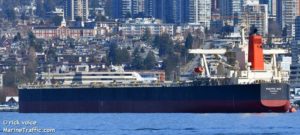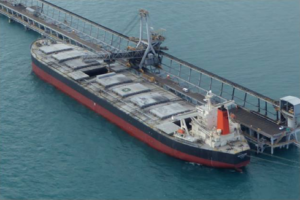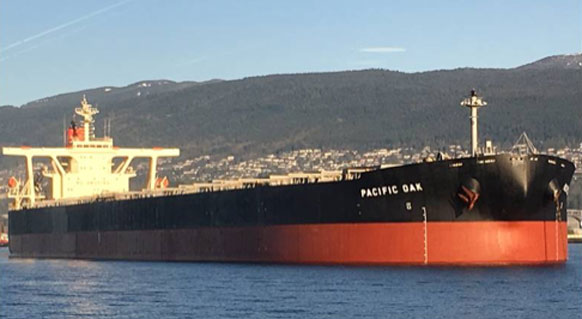Pacific Oak – Ship of the Week March 15, 2017 | West Pacific Marine
Anchored in the direct route between Seabus Terminals last weekend and earlier this week was the Japanese owned Capesize bulk carrier Pacific Oak. That she was anchored in the inner harbour for an extended period continues to highlight the acute shortage of Capesize anchorages available to us. Pacific Oak was waiting for cargo readiness to load coal at Westshore’s Roberts Bank Terminal. I caught the above picture while on the Seabus heading over to the HSBC Canada Sevens rugby tournament for one of the best weekends of the year for entertainment in Vancouver.
Built by JMU Ariake Shipyard, Kumamoto, Japan in 2005
Owned and operated by Hokuku Marine, Tsukumi, Japan
LOA 299.95m
Beam 50.0m
GRT 101,933 tons
DWT 203,212 MT


After a downturn in 2016, coal exports through the Port of Vancouver in staged a recovery in 2017 with an overall increase of around 11% to 36.8 million tons. British Columbia’s alternative export coal outlet, Ridley Terminals in Prince Rupert, saw coal shipments recover to 7.6 million tonnes, a 90% increase over 2016 volumes. While there are countries that have seen a decline in consumption, coal still makes up 29% of global primary energy and 41% of global electricity. In its latest forecast, BP sees that China will remain the world’s largest market for coal, accounting for nearly half of global coal consumption in 2035. India is also the largest growth market, with its share of world coal demand doubling from around 10% in 2015 to a forecast 20% in 2035.
Also in the 2018 Energy Outlook, https://www.bp.com/en/global/corporate/energy-economics/energy-outlook.html BP highlights how growing industrialisation and prosperity will drive an increase in global energy demand and how that demand will be met with an increasingly diverse energy mix. The Outlook highlights that while China is moving away from coal and has significantly increased its solar and wind capacity, it has also increased coal generation by a third and coal still accounts for more than half of the country’s energy mix. At the same time, the coal industry is strongly supportive of low emissions technologies to help meet global climate goals, including carbon capture, use and storage (CCUS) which can reduce emissions from fossil fuels by up to 90%..
Fiji won the Canada Sevens by the way, with Kenya runners up and South Africa taking the bronze.

